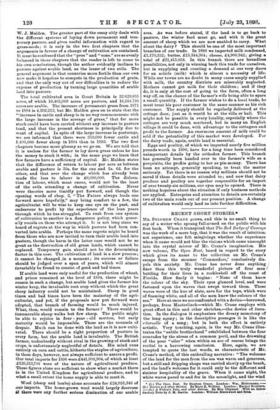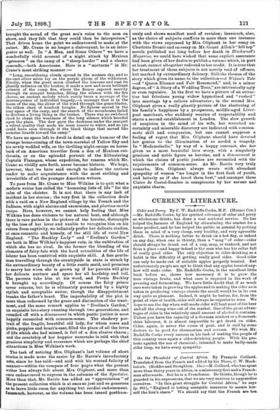RECENT SHORT STORIES,
Mn. STEPHEN CRANE grows, and this is no small thing to say of a writer who sprang fall-armed on the public with his first book. When it transpired that The Bed Badge of Courage was the work of a mere boy, that it was the result of intuition, not experience, one felt misgivings whether the experience when it came would not blur the visions which came unsought into the crystal mirror of Mr. Crane's imagination. His new volume, The Open Boat, based in regard to the story which gives its name to the collection on Mr. Crane's escape from the steamer Commodore,' conclusively dis- pels this anxiety. Mr. Crane has never done anything finer than this truly wonderful picture of four men battling for their lives in a cockleshell off the coast of Florida. How finely it begins : "None of them knew the colour of the sky. Their eyes glanced level, and were fastened upon the waves that swept toward them. These waves were of the hue of slate, save for the tops, which were of foaming white, and all of the men knew the colours of the sea." Here at once we are confronted with a device—borrowed, perhaps, from Maeterlinck—which Mr. Crane employs with great effect in this and other sketches,—the device of itera- tion. In the dialogue it emphasises the dreary monotony of the long agony ; in the descriptive passages it is like the ritornello of a song ; but in both the effect is entirely artistic. Very touching, again, is the way Mr. Crane illus- trates the "subtle brotherhood" established between the four comrades by the stress of a common peril, and the drowning of the poor "oiler" when within an ace of rescue brings the recital to a harrowing conclusion. Here, again, we are tempted to quote the last words, so characteristic of Mr. Crane's method, of this enthralling narrative : "The welcome of the land for the men from the sea was warm and generous, but a still and dripping shape was carried slowly up the beach, and the land's welcome for it could only be the different and sinister hospitality of the grave. When it came night, the white waves paced to and fro in the moonlight, and the wind • (1.) The Open Boat. By Stephen Crane. London: Wm. Heinemann.— (2.) Silence a:,d other Stories. By MAry E. Wilkins. London: Harper Brothers. —(3.) A Widow's Tale, and other Stories. By Mrs. Oliphant With an Intro- ductory Note by J. M. Barrie. London: William Blackwood and Sons.
brought the sound of the great sea's voice to the men on shore, and they felt that they could then be interpreters." That drives home the point we endeavoured to make at the outset. Mr. Crane is no longer a clairvoyant, he is an inter- preter as well. In "A Man, and Some Others" we have a wonderfully vivid account of a night attack by Mexican "greasers" on the camp of a " sheep-herder " and a chance
comrade,—both Americans. Here is a " nocturne " in Mr. Crane's most striking manner :— " Long, smouldering clouds spread in the western sky, and to the east silver mists lay on the purple gloom of tho wilderness. Finally, when the great moon climbed the heavens and cast its ghastly radiance on the bushes, it made a new and more brilliant crimson of the camp fire, where the flames capered merrily through its mesquit branches, filling the silence with the fire chorus, an ancient melody which surely bears a message of the inconsequence of individual tragedy,—a message that is in the boom of the sea, the sliver of the wind through the grass-blades, the silken clash of hemlock boughs. No figures moved in the rosy space of the camp, and the search of the moonbeams failed to disclose a living thing in the bushes. There was no owl-faced clock to chant the weariness of the long silence which brooded upon the plain. The dew gave the darkness under the mesquit a velvet quality that made air seem nearer to water, and no eye could have seen through it the black things that moved like monster lizards toward the camp."
We have no space left to dwell in detail on the humour of the strange home-coming of the town-marshal of Yellow Sky and his newly wedded wife, on the thrilling night-escape on horse- back of an American traveller from a den of Mexican cut- throats, or on the splendid portrait of the filibustering Captain Flanagan, whose expedition, for reasons which Mr. Crane so vividly sets forth, never became historic. We hope, however, that we have said enough to induce the curious reader to make acquaintance with the most striking and irresistible of all the younger American writers.
To pass from Mr. Crane to Miss Wilkins is to quit what a modern writer has called the "humming lists of life" for the ulna of the cloister. It is not that there is any lack of
incident in her stories ; the very first in the collection deals with a raid on a New England village by the French and the Indians, with night alarms and excursions, and plurima mortis imago. Here, however, we cannot help feeling that Miss Wilkins has done violence to her natural bent, and although there is rare pathos in the picture of the heroine, distraught
by the loss of her lover and unable to recognise him on his return from captivity, we infinitely prefer her delicate studies, at once romantic and homely, of the still life of rural New England. "The Buckley Lady" and "Evelina's Garden" are both in Miss Wilkins's happiest vein, in the cultivation of which she has no rival. In the former the blending of the elements of fairy-tale with the hard actualities of the life of labour has been contrived with exquisite skill. A fine gentle- man travelling through the countryside in state is struck by the extraordinary beauty of a little rustic maid, and promises to marry her when she is grown up if her parents will give her delicate nurture and spare her all hardship and toil. The parents take him at his word, and Persia Buckley is brought up accordingly. Of course the fairy prince never returns, but he is ultimately personated by a highly
stylish and acceptable suitor, though the disappointment breaks the father's heart. The improbability of the plot is more than redeemed by the grace and distinction of the treat- ment, and the same remark applies to "Evelina's Garden," an exquisite love-story running through two generations, and rounded off with a denouement in which poetic justice is most
happily reconciled with common-sense. The shadowy por- trait of the fragile, beautiful old lady, for whom roses and pinks, poppies and heart's-ease, filled the place of all the loves of life which she had missed, is full of a dim elusive charm ; and the courtship of her happier namesake is told with that gracious simplicity and reverence which are perhaps the chief attractions in Miss Wilkins's work.
The task of noticing Mrs. Oliphant's last volume of short stories is made none the easier by Mr. Barrie's introductory sate, since he has said—and said with his wonted felicity of manner—within the compass of four pages what the present writer has always felt about Mrs. Oliphant, and more than once endeavoured to express in the columns of the Spectator. More than that, Mr. Barrie has added an " appreciation " of the present collection which is at once so just and so generous as to leave little room for anything but cordial endorsement. Inaamm3h, however, as the volume has been issued posthum- ously and shows manifest need of revision; inasmuch, also, as the choice of subjects conflicts in more than one instance with the views expressed by Mrs. Oliphant in her essay on Charlotte Brontë and an essay on Mr. Grant Allen's " hill top" novels published not long before her death in Blackwood's Magazine, we could have wished that some explicit assurance had been given of her desire to publish a volume which, in part at least, cannot altogether redound to her credit. It is true that her treatment of these subjects is not merely void of offence, but marked by extraordinary delicacy. Still the themes of the story which gives its name to the collection—A Widow's Tale —of "Queen Eleanor and Fair Rosamond," and, in a minor degree, of" A Story of a Wedding Tour," are intrinsically ugly or even repulsive. In the first we have a picture of an attrac- tive but frivolous young widow hypnotised and " rushed " into marriage by a callous adventurer; in the second Mrs. Oliphant gives a really ghastly picture of the shattering of his family's happiness by a prosperous, middle-aged Liver- pool merchant, who suddenly wearies of respectability and starts a second establishment in London. The slow growth of suspicion in the mind of his wife, her wretched un- certainty and miserable discovery are indicated with consum- mate skill and compassion, but one cannot suppress a feeling of regret that Mrs. Oliphant should have devoted her genius to the illumination of so sordid a tragedy. In "Mademoiselle," by way of a happy contrast, she has given us a most beautiful love story, with a singularly gracious and noble figure as heroine, and a denouement in which the claims of poetic justice are reconciled with the requirements of common-sense. As Mr. Barrie very truly remarks, Mrs. Oliphant always wrote with abundant sympathy of women "no longer in the first flash of youth, and latterly as if she loved them best," and amongst these Claire de Castel-Sombre is conspicuous by her serene and exquisite charm.



































 Previous page
Previous page